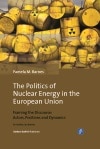Pamela Barnes: The Politics of Nuclear Energy in the European Union – Framing the Discourse: Actors, Positions and Dynamics
The overall use of nuclear electricity in the European Union is unlikely to change significantly despite the controversies surrounding its use within the EU. Author Pamela M. Barnes questions the role that nuclear electricity plays in meeting the challenges of providing secure, competitive and sustainable energy. The analysis focuses on the evolution of the discourse on nuclear energy amongst policy makers at European and national levels as well as amongst the general public.
We are happy that Pamela M. Barnes agreed to reply to our 5 questions. Before we start, a short CV is given by the author:
 Research Associate at the EU-Asia Institute, ESSCA School of Management, Angers, France
Research Associate at the EU-Asia Institute, ESSCA School of Management, Angers, France- Jean Monnet Chair ‘ad personam’ in European Political Integration
- formerly Principal Lecturer in the School of Law at the University of Lincoln, UK
Her current research interests include nuclear energy policy development in the European Union, development of new energy technologies in the EU, its sustainable development policy and decision making in an increasingly diverse European Union. She has authored and co-authored several books on EU, enlargement, EU environmental policy, sustainability and governance in the European Union and the development of its nuclear energy policy. In addition she has authored a number of articles and book chapters on a variety of issues in the areas of EU enlargement, its environmental policy, the impact of the EU’s CAP, the role of the EU in global climate change politics, the Euratom Treaty, EU citizenship, EU institutional developments and decision-making.
1) What will be the main challenge for your research field in the coming years?
As a political scientist with an interest in European integration, the biggest challenge facing my research field in the coming years is to analyze and make accessible, for scholars and the general public alike, an understanding of the processes of change currently taking place in Europe. The challenges and dangers of such processes are immense and it is the responsibility of academia to provide a non-threatening forum in which debate may take place about the impact of the rise of such societal trends as populism or the implications of the rise of climate change activism. It is the responsibility of academics to provide the policy makers with the means to analyze and understand the many challenges facing the European democracies, and to propose solutions.
2) Why would anyone want to pursue research in your field?
The researcher is not constrained by working within a specific theoretical framework. The issues confronting European society in the twenty-first century are real world contemporary issues and the researcher is asked to draw on concepts and ideas from many disciplines in analyzing and forming understanding of those issues. With regard to my most recent specific interest in analysis of the politics of nuclear energy in the EU, this provides the researcher with the opportunity to explore the issue from a number of perspectives including economic, political, historical, legal, security and social dimensions. Although nuclear fission is not a new technology, other technological innovation is evident in the nuclear sector. New uses for nuclear technology are coming to the fore in health, agricultural and industrial processes. For many people the use of nuclear energy produces an emotional response that requires a researcher to be open to a range of analytical skills not usually within the canon of political science.
3) Why did you choose your research field? What motivates you in your field in particular?
My motivation in choosing the overall field of my research has not altered. It remains based on a deep-seated view that cooperation and collaboration between European states is advantageous for all. In regard to my research on nuclear energy politics I became interested in the area almost by accident. It evolved from my research in the development of EU environmental and energy policies and a realization that from the mid 2000s in the EU nuclear energy had moved from being regarded as an undesirable energy resource to one that for many was seen as having a part to play in a low carbon energy future. I questioned why this might be the case. Seeing nuclear energy as a low carbon resource appeared to have given it a new credential but it remains a highly controversial resource that does not have universal support in Europe.
4) Which (academic) book has influenced you most?
I found this most difficult of the questions to answer. There is no single book, nor indeed individual, that has influenced me most, but if I have to choose then Ernst Haas’s book The Uniting of Europe was, as for many scholars, one of the first I turned to in my study of the process of European integration. In presenting his neo-functionalist explanation of the European Coal and Steel Community and the evolution of the European Economic Community he provided a framework for the study and analysis of European integration. As a theoretical framework neo-functionalism has many limitations, acknowledged by Haas himself in his later writings, but it has provided an important basis and starting point for scholarship throughout the history of the EU.
5) I am an author with Barbara Budrich because …
… of the guidance and support provided by staff of the publishing house. They were patient with and responded quickly to my many questions.
Published by Budrich:
 Pamela M. Barnes, co-author Ian Barnes: The Politics of Nuclear Energy in the European Union – Framing the Discourse: Actors, Positions and Dynamics
Pamela M. Barnes, co-author Ian Barnes: The Politics of Nuclear Energy in the European Union – Framing the Discourse: Actors, Positions and Dynamics
© header image: Sketchify , created with canva.com; portrait Pamela M. Barnes: private

